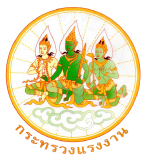The Ministry of Labour’s Spokesperson, Mr. Phumiphat Mueanchan, said that the Labour Minister, Mr. Phiphat Ratchakitprakarn, received a report from the Department of Employment, Labour Section, Royal Thai Embassy in Tel Aviv and the Labor Office in Saudi Arabia regarding the tense situation in Israel and Lebanon; it reported a possibility that the situation might expand and intensify from the incident on July 31, 2024 in Iran. The Ministry of Labour has assessed the situation and would like to inform Thai workers to temporarily postpone traveling to work in Israel and Lebanon by all means until further notice.
Sending Thai workers to work abroad is an important policy of the Ministry of Labour, which aims to help drive the economy. This year, the target is set at 100,000 people. As of the end of July, 77,918 Thai workers have been sent abroad, accounting for 77.92 percent of the target. Most recently, the Labour Minister signed a Memorandum of Understanding on sending Thai workers to the Republic of Korea under the Employment Permit System (EPS) between the Thai Ministry of Labour and the Korean Ministry of Labour and Employment, in accordance with the Cabinet resolution on July 23, 2024. This Memorandum of Understanding has a duration of two years and will be effective until a new Memorandum of Understanding is signed. This version adds measures to help workers in the event of a disaster and reduces the time to return to work in South Korea for workers who have worked for four years and ten months without changing jobs to one month from the original three months. This year, Thailand has been allocated a quota of E-9 visa workers in the manufacturing industry, agriculture and livestock, construction, and service work, totaling 8,688 people, 3,888 more than last year. Currently, 3,270 workers have been sent. It is expected that the allocated quota will be met.
“This MOU will be a clear framework for cooperation in sending Thai workers to work in South Korea, from recruiting workers, language and skills testing, travel fees or expenses, visa and immigration, work and residence, and return when the specified period of work has been completed. These will help prevent illegal stays in South Korea, create transparency, and take into account the mutual benefits of both parties,” said Mr. Phumiphat.
——————————
Division of Public Relations





